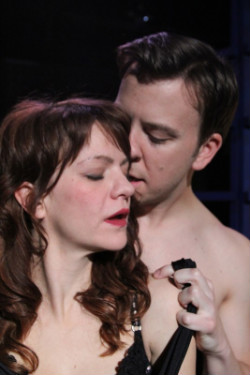Paper Cranes

Susan Louise O'Connor and Eric T. Miller in Paper Cranes. Photo by Lauren Fritz.
.
BOTTOM LINE: This highly engaging drama offers interweaving storylines that explore the struggles five characters face in coping with the past, and finding meaningful connections and sexual fulfillment. A compelling production that never has a dull moment.
Sometime in fifth grade my class embarked upon reading Sadako and the Thousand Paper Cranes, the story of a Japanese girl who develops cancer due to radiation exposure from the US bombing of Hiroshima. She makes a thousand paper cranes in the hopes of fulfilling her wish to live. Gifted playwright Kari Bentley Quinn used this story as inspiration for her new work Paper Cranes. Much like the primary school story, it merges drama and sentimentalism with enough grit to make it feel like a reflection of real life rather than over the top melodrama.
Paper Cranes centers around five lost individuals trying to find love, closure, and sexual fulfillment even with their baggage and less than perfect circumstances. Amy (Susan Louise O'Connor) sets her sights on engaging in anonymous sadomasochistic sexual encounters with men she meets online, hoping for a brief moment to transcend the pain and confusion of her existence. She eventually meets David (Eric T. Miller), who is hoping to find solace from the pain of recently losing his girlfriend in a brutal murder.
Much like a Mary Gaitskill character, Amy seeks out affection in self damaging sexual situations. While leaning up against a bar room wall, she addresses the audience, explaining away her behavior as if giving her the chance to lose herself for at least a few moments. Her sexual submission seems an unusual contrast to her wise cracking personality out of the bedroom, offering up advice and wisdom to the doubtful Julie. We soon learn that David's fascination with her stems from her bearing an uncanny resemblence to his deceased girlfriend. David's hunger for sadism is never fully fleshed out, though he informs the audience that it initially stemmed from a need to escape the agony of dealing with his girlfriend's death. When we learn that his girlfriend died at the hands of a violent rapist, one wonders why he would desire to exert domination and violence over a woman who reminds him of the woman he lost. When he suddenly seems to be a slightly damaged Mr. Right for Mona, who he knows through a support group, his burst of kindness and normalcy seems unexpected. While the twists and turns of his character may not be easily comprehended, his actions nonetheless remain engrossing.
The use of lighting in the production is also highly effective, evoking the dimness of a dive bar one moment and the brightness of a Starbucks the next, making a somewhat minimal set feel like multiple locations. The play's talented cast of actors also contribute greatly to the success and compellingness of the production as each actor is able to seamlessly switch from the work's heavy drama to more comedic moments. Susan Louise O'Connor (Broadway's Blithe Spirit) gives a standout performance as Amy, showing aggressive strength that hides inner weakness and doubt.

